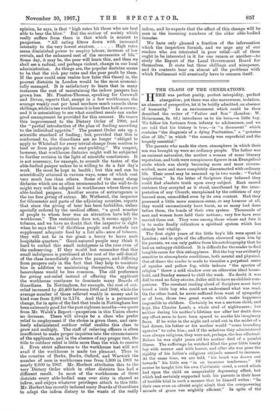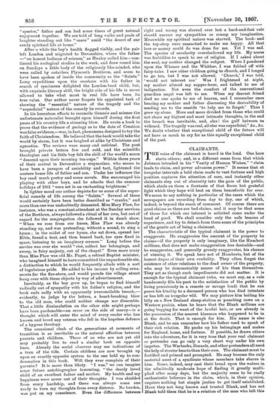THE CLASH OF THE GENERATIONS.
" HERE was perfect purity, perfect intrepidity, perfect abnegation; yet there was also narrowness, isolation, an absence of perspective, let it be boldly admitted, an absence of humanity." In an environment which could be thus
described the writer of " Father and Son " (London : W.
Heinemann, 8s. 6d.) introduces us to his hero,—a little boy. We follow his fortunes from infancy to adolescence, and we are told that his history is true,—is "a document" which contains "the diagnosis of a dying Puritanism," a "genuine slice of life," in which " the comedy was superficial and the tragedy essential."
The parents who made the stern atmosphere in which their son was brought up were no ordinary people. The father was an eminent naturalist, the mother a woman of some literary reputation, and both were conspicuous figures in an Evangelical circle which was slowly becoming more and more circum- scribed, more and more completely disconnected with ordinary life. Their creed may be summed up in two words : " Verbal inspiration." In the letter of Scripture they believed they could find absolute truth upon every subject. Each sacred sentence they accepted as it stood, unsoftened by the inter- pretation of any Church, unexplained by the criticism of any learned man, unmodified even by its own context. Had they possessed a little more common-sense, or any humour at all, they would unconsciously have burst, as so many had done before them, the bonds of their own system. Thousands of men and women have held their notions ; very few have ever carried them out. They were among those whose sad fate it is to make finally ridiculous a spiritual system which has already lost vitality.
The first eight years of the little boy's life were spent in London ; and in spite of the affection showered upon him by his parents, we can only gather from his autobiography that he had an unhappy childhood. It is difficult for the reader to find tangible cause for this unhappiness. But the boy was evidently sensitive to atmospheric conditions, both mental and physical. Out-of-doors the reader is made to visualise a perpetual scene of squalor and yellow fog, while indoors "the spectre of religion" threw a cold shadow over an otherwise ideal house- hold, and Sunday seemed to chill the week. No doubt it was dull to read no fairy-stories, duller still to have no childish com- panions. The constant reading aloud of Scripture must have bored a little boy who could not understand what was read. On the other hand, he never suffered from want of sympathy or of love, those two great wants which make happiness impossible to children. Certainly he was a nervous child, and kept, like Charles Lamb, a whole stud of nightmares ; but neither during his mother's lifetime nor after her death does any effort seem to have been spared to soothe his imaginary fears. If he woke in the night and cried out in the midst of a bad dream, his father or his mother would " come bounding upstairs" to calm him ; and if the sedatives they administered were always religious, they were not, perhaps, the less effectual. Before be was eight years old his mother died of a painful illness. The sufferings he watched filled the poor little lonely boy with sorrow and with horror, and after she was gone the rigidity of his father's religious attitude seemed to increase. At the same time, we are told, " his heart was drawn out towards" his little son "in an immense tenderness." Of course he taught him his own Calvinistic creed, a creed which had upon the child an unspeakably depressing effect, but which had certainly supported both his parents in their hour of terrible trial in such a manner that he himself writes : "In their case even an atheist might admit that the overpowering miracle of grace was mightily efficient." In spite of the
"spectre," father and son had some times of great natural enjoyment together. We are told of long walks and peals of laughter standing out like " oases " amid "the desert of our sandy spiritual life at home."
After a while the boy's health flagged visibly, and the pair left London and migrated to Devonshire, where the father —" an honest hodman of science," as Huxley called him—con- tinued his zoological studies in the week, and drew round him on Sundays a little body of the religiously like-minded, who were called by outsiders Plymouth Brethren, and seem to have been spoken of inside the community as the "Saints." Long expeditions upon the seashore with his father in search of specimens delighted the London-bred child, but, with exquisite literary skill, the bright side of his life is never allowed to take what must in real life have been its true value. Our author never forgets his appointed task of showing the " essential" nature of the tragedy and the "superficial" nature of the comedy be records.
In his herculean efforts to reconcile Genesis and science the unfortunate naturalist brought upon himself during the first years of his country life a stunning blow. He wrote a book to prove that the evidence of geology as to the date of Creation was false evidence,—was, in fact, phenomena designed to try the faith of Christendom. He believed that the book would take the world by storm, but it was laughed at alike by Christians and agnostics. The reviews were many and satirical. The post brought private letters few and cold, and the scientific theologian and his little boy felt the chill of the world's scorn " descend upon their morning tea-cups." Within three years of their arrival in Devonshire a stepmother, who seems to have been a paragon of amiability and tact, lightened the austere borne life of father and son. Under her influence the boy read much poetry and some novels. She encouraged his playing with other boys, and he admits that the summer holidays of 1861 "were set in an enchanting brightness."
In lighter mood our author depicts for us some of the super- ficial comedy of life among the "Saints." Several of these would certainly have been better described as "cranks," and more than one was undoubtedly demented. Miss Mary Flaw, for instance, who was a constant attendant at the Sunday services of the Brethren, always followed a ritual of her own, but out of regard for the congregation she followed it in dumb show. " When we rose from our knees, Miss Flaw was already standing up, and was pretending, without a sound, to sing a hymn ; in the midst of our hymn, she sat down, opened her Bible, found a text, and then leaned back, her eyes fixed in space, listening to an imaginary sermon." Long before the service was over she would " rise, collect her belongings, and sweep, in fairy majesty, out of the chapel." Even more crazy than Miss Flaw was old Mr. Paget, a retired Baptist minister, who imagined himself to have committed the unpardonable sin, a distinction to which he would frequently allude with a sort of lugubrious pride. He added to his income by selling orna- ments for the fire-stove, and would parade the village street hung over with these objects by way of advertisement.
Inevitably, as the boy grew up, he began to find himself radically out of sympathy with his father's religion, and the book ends sadly with an apparently irreconcilable breach,— evidently, to judge by the letters, a heart-breaking blow to the old man, who could neither change nor dissemble. That a little dissimulation on the other side might perhaps have been pardonable—an error on the side of mercy—is a thought which will enter the mind of every reader who has known and loved any veteran who fell in the hopeless defence of a bygone theology.
The occasional clash of the generations at moments of transition is as inevitable as the natural affection between parents and children. Those of us who are not yet old may probably live to read a similar book on opposite lines. Already the social observer may see indications of a turn of the tide. Certain children are now brought up upon an exactly opposite system to the one held up to con- demnation in this book. Will they ever complain of their parents P It is more than likely. "I was," we can imagine some future autobiographer lamenting, "the dearly loved child of an excellent father and mother. My health and my happiness were never out 'of their thoughts. I was shielded from every hardship, and there was always some one ready to turn my thoughts from every distress. No burden, was put on my conscience. Even the .difference between right and wrong was slurred over lest a hard-and-fast rule should narrow my sympathies or cramp my imagination. Meanwhile my spiritual nature was starved. The book- and the toy-shop were ransacked to make me happy. All that love or money could do was done for me. Yet I was sad. The spectre of secularity overshadowed my life. My nurse was forbidden to speak to me of religion. If I asked about the soul, my mother changed the subject. When I pondered upon the Whence and the Whither, I was fobbed off with fairy-tales. I saw other children going to church, and I longed to go too, but I was not allowed. ` Church,' I was told, would • not interest me.' Was I frightened- at night, my mother altered my supper-hour, and talked to me of indigestion. Not even the comfort of the conventional guardian angel was left to me. When my dearest friend died no one spoke to me of heaven, and I remember once hearing my mother and father discussing the desirability of sending me to the seaside to help me to forget.' Thus I grew up alone. More and more divided from those who could not share my highest and most intimate thoughts, in the end the breach was inevitable, and, alas ! the gulf between us widened. The tragedy was real, all else was superficial," &c., &c. We doubt whether that exceptional child of the future will not have as much to cry for as this equally exceptional child of the past.



















































 Previous page
Previous page